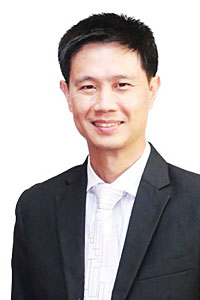
Being the younger brother of the junta leader and prime minister may not be the best thing in Thailand right now.
Ask Gen Preecha Chan-o-cha, who is due to retire from the post of permanent secretary of the Defence Ministry next Friday. He has been hit with bad press, again, thanks to opponents of the National Council for Peace and Order (NCPO) headed by his brother Gen Prayut Chan-o-cha. But defending the remarks given by himself and Gen Prawit Wongsuwon, deputy prime minister for security affairs and the "Big Brother" of the NCPO, may not be what most people would like to hear.
Since last week, foes of the NCPO and the general public have had a field day in criticising the "inappropriate" manners of Gen Preecha's wife, Ms Phongphan. They question why a weir, "Mother Phongphan Development Weir", built to celebrate Their Majesties the King and Queen, was named after her, though it was funded by a state budget. They ask why Ms Phongphan was treated like royalty during a ceremony to open the weir in Fang district of Chiang Mai.

Nopporn Wong-Anan is deputy editor, Bangkok Post.
Then this week, activist Srisuwan Janya as the secretary-general of the Association for the Protection of the Constitution, petitioned the National Anti-Corruption Commission to check for any irregularities in construction contracts won by Contemporary Construction Co, owned by Pathompol Chan-o-cha, Gen Preechai's son.
Questioning how a novice firm with a registered capital of just one million baht was able to win military projects worth nearly 100 million baht in less than two years, Mr Srisuwan asked the graftbusting agency to check for irregularities in the bidding process and projects awarded to the firm.
The firm won seven projects with the 3rd Army Region between December 2014 and April this year worth a combined 97 million baht, according to the investigative journalism website, Isra News Agency.
Gen Preecha, who was the commander of the 3rd Army Region from October 2013 to September 2014, has insisted he had nothing to do with his son winning those projects. He was promoted to become the assistant chief of the army between October 2014 and September 2015.
For Big Brother Prawit, he believes Gen Preecha and Mr Pathompol did nothing wrong as "the bidding process was accessible to all bidders, provided they did everything in a straightforward manner", suggesting there was no collusion among bidders as the projects went through the e-bidding system and no bidder knew what prices other competitors submitted.

Such remarks surprised no one given Gen Prawit's track record of protecting his subordinates.
In April, Gen Prawit and Gen Prayut separately defended Gen Preecha's appointment of his other son, Patipat, to a post at the defence ministry without going through a qualifying examination, as legitimate.
Admitting he recruited Mr Patipat, who has a BA degree in communications, to fill a vacant post in the civil affairs directorate through a "special process", Gen Preecha said several other military officers had done this before, suggesting it might be the Chan-o-cha family's name which attracted attention and caused the uproar.
Though nepotism is the norm in Thai society and anyone who has the power, opportunity or connections will resort to it, it is a form of graft that the coup leaders have vowed to tackle.
The so-called "regime" of ousted premier Thaksin Shinawatra and his proxies was marred with alleged corruption, cronyism and nepotism -- the three scourges that have hindered Thailand for decades. They are also among the excuses the two military teams of coup makers in 2006 and 2014 used when they toppled elected civilian governments, but have failed to eliminate from the kingdom in the past decade.
A lot of measures to prevent civilian politicians from taking bribes or abusing their power have been put in the new charter and are being worked out in other organic laws, but apparently civil servants and men in uniform don't face the same rigid mechanisms.
The NCPO must not treat the Preecha Chan-o-cha family's scandals as just another ploy to discredit them by its opponents or Thaksin supporters.
Such questionable practices, if accumulated and not addressed properly, will gradually degrade the support that the NCPO has received from its primary base of the urban middle class, despite its near absolute power to run the country.
Modern Thai political history shows that political millipedes have fallen out of the political drain when they have became hubristic with their authority.
